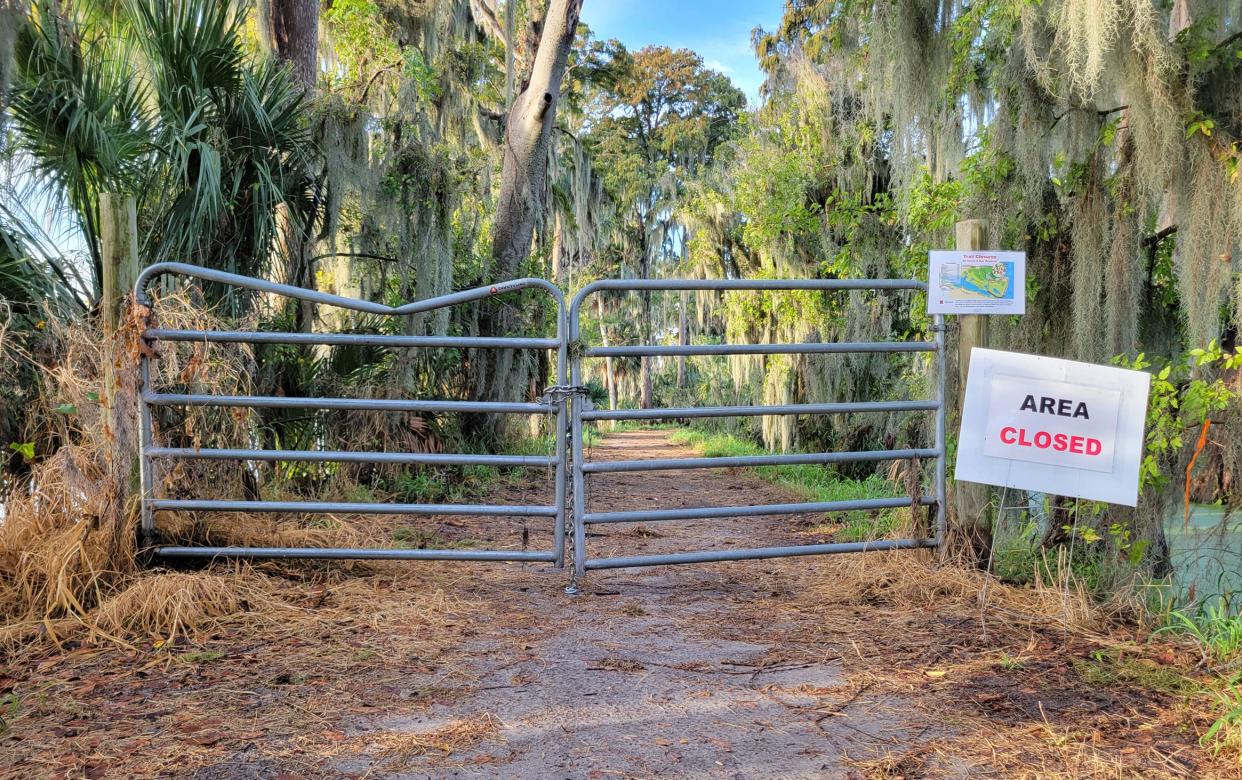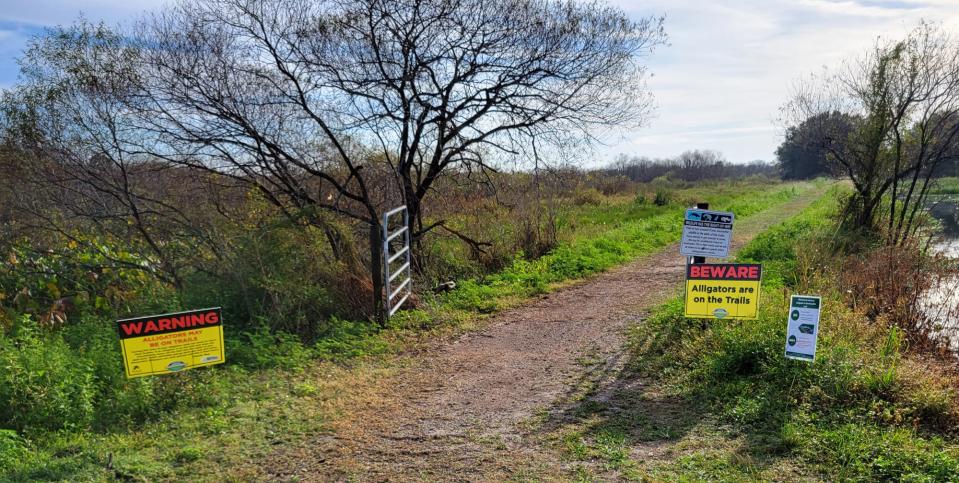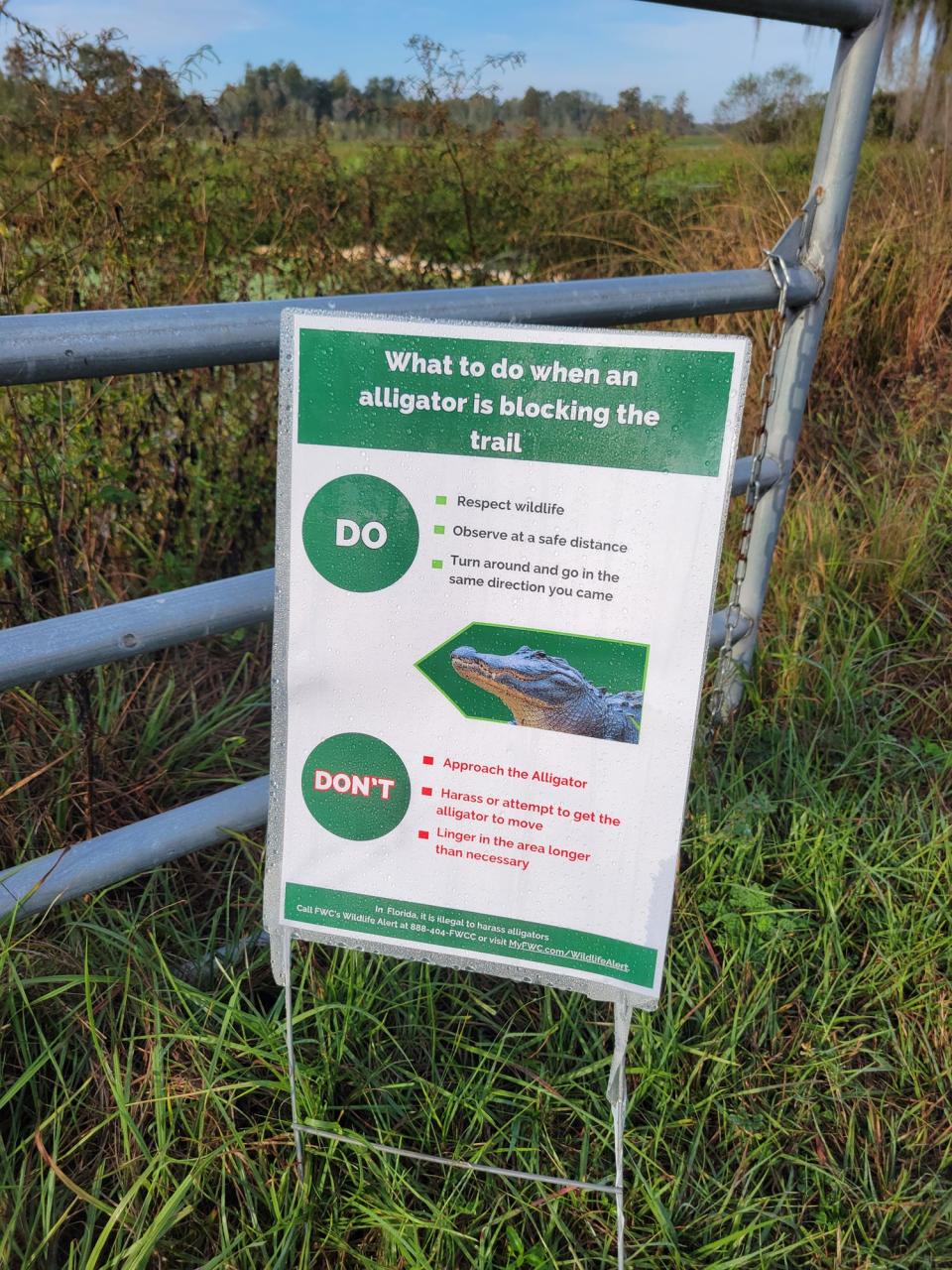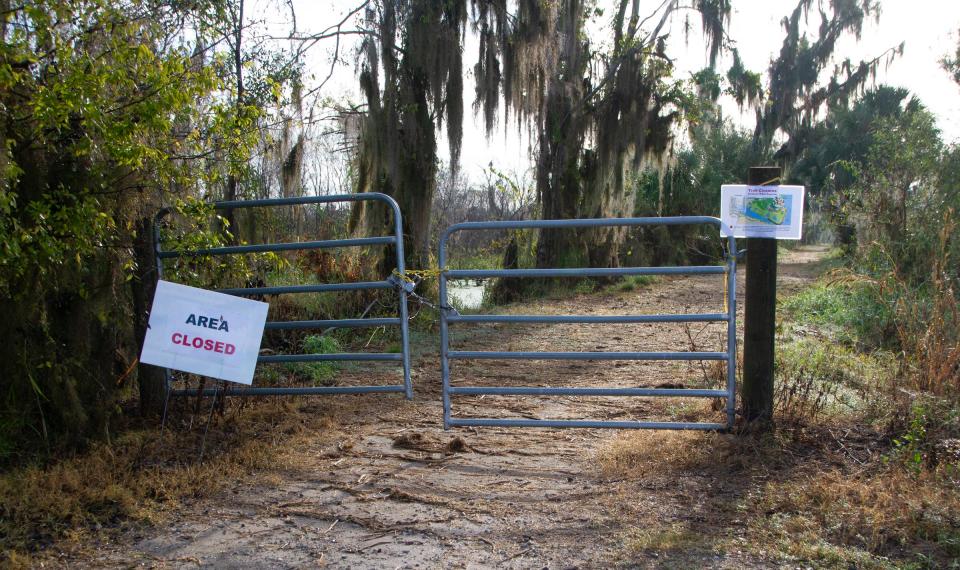It just reopened, and now alligator activity is closing a popular trail at Circle B again

LAKELAND — Alligator Alley, or at least a portion of it, again belongs to the alligators alone.
Recent visitors to Circle B Bar Reserve, Polk County’s most popular natural property, have found metal gates blocking a stretch of the Alligator Alley trail. In addition, yellow signs have popped up offering such warnings as “Alligators may be on trails.”
The temporary closure occurred on Nov. 7, the same day that a Facebook post showed a large alligator slumped across a different trail as a group of photographers stood near it, snapping photos. The woman who captured the image and shared the post wrote, “Bruce was on the loose. (And those people ended up poking him with a palm frond to get him to move)” — followed by three angry-face emojis.
But there is no direct connection between that incident and the partial closure of Alligator Alley, a manager of the property said.
Polk County Parks and Natural Resources, which manages Circle B, periodically closes trails out of concern for alligator activity, most commonly during the late spring and summer, when the animals are most actively mating. The 1,267-acre restored wetlands borders Lake Hancock, which teems with alligators, and contains a network of marshes also inhabited by the toothy reptiles.
Alligators move between wet areas throughout the reserve, sometimes crossing trails used by hikers, birdwatchers and bicyclists.
The portion of Alligator Alley now closed runs from the turn along Lake Hancock to the crossing with Heron Hideout, one of the most secluded and scenic trail sections in the reserve.
Tabitha Biehl, Polk County’s Land and Water Natural Areas manager, said her department opted for the temporary closure based on an increase in reports of alligators crossing the trail.

“We had a situation where we just felt that, due to the number of calls that were coming in, that we needed to protect that section of trail where the alligators were at still … by blocking it off for a short while until the weather warms back up,” Biehl said. “We’ve done this before, where we have to close for a week or two and then open back up just because of where the alligators are at with their young, and the cold weather and all those kinds of things.”
Biehl said her staff received reports of multiple daily alligator crawls over that section of the trail.
“We've been watching it very closely for a couple of weeks, and we just needed to take a pause and block a small section off to protect the resident alligators and visitors at the same time,” she said.
Biehl said she could not predict how long the segment of Alligator Alley will be closed.
Report of harassment
The closure was not a response to a specific incident, Biehl said. Asked about the Facebook post claiming visitors had poked an alligator on Marsh Rabbit Run, a trail that is a westward continuation of Alligator Alley, she said: “We did not get anything directly reported to us on that. I think that if we did, we would have had the FWC (Florida Fish and Wildlife Conservation Commission) officers respond. But nothing was ever brought to us directly on that.”
It is illegal to harass or feed alligators, either of which can alter their natural behavior. The FWC’s Statewide Nuisance Alligator Program permits the killing of about 7,000 animals a year that are deemed dangerous, often because feeding has caused an alligator to associate humans with food.
Lindsay Terramiggi of Winter Haven, the woman who posted on Facebook about the incident, said she took the photo that shows four people with cameras standing or squatting behind the stationary alligator, one her daughter has nicknamed “Bruce.” Terramiggi, who was a safe distance away on the other side of the animal, estimated that one of the photographers was about three feet from the alligator.
Terramiggi said she turned and headed back down Marsh Rabbit Run, away from the alligator, and did not witness the alleged prodding. But she said she later encountered the four hikers on another trail, and one of them bragged that they had forced the alligator to move off the trail by poking it with a palm frond.
Based on their accents, Terramiggi suspected the group hailed from the Northeast.
“I just shook my head and kept walking,” she said. “I probably should have reported it at the time.”
Another hiker who had been standing near Terramiggi when she took the photo confirmed seeing the poking incident, she said.

Terramiggi’s post drew 22 comments before an administrator turned them off. (The Facebook page is privately managed and not associated with Polk County.)
Sample comments:
“And then when he attacks in self-defense, as any wild animal would in their home, he'll get killed because he's a nuisance.”
“Hence why I don’t go there anymore, I lose my temper at the idiots on the trails.”
“They deserve to be on the lunch menu. Morons!”
Reinier Munguia, president of Lake Region Audubon, was not surprised to learn of the reported harassment of an alligator at Circle B. Munguia, a Lakeland resident for 20 years, said he has seen children throwing rocks at alligators in the reserve as their parents stood nearby.
“We're failing in educating people about how to coexist with wildlife, period,” Munguia said. "That’s my big take on this one.”
Managers have installed staked signs at the gates on each end of the closed section of Alligator Alley and on other trails at Circle B. One sign bears the word “WARNING” in large red letters, with smaller type beneath stating, “During this time of year alligators seek out areas to warm their bodies. If an alligator is on the trail and does not immediately move off the trail into the water as you approach, turn around and go back the way you came. Remember alligators are wild animals and this is their home.”
Another sign cautions, “What to do when an alligator is blocking the trail.”
Next to the word “Do,” it advises, “Observe at a safe distance” and “Turn around and go in the same direction you came.” The admonitions beside “Don’t” include “Approach the alligator,” “Harass or try to get the alligator to move” or “Linger in the area longer than necessary.”
A Circle B of the east? Plans for vast Lake Marion Scrub project are coming together
The budget for Polk County Parks and Natural Resources does not allow for the hiring of staff to patrol the trails at Circle B. Biehl said her department relies on a network of volunteers and on visitors to be alert to any problems or misbehavior.
Anyone who witnesses harassment of a wild animal should call the FWC’s hotline at 888-404-3922, she said.
Nuisance calls are common
Axios Tampa Bay recently reported that the FWC directed a licensed trapper to remove three alligators from Lake Eli in St. Petersburg. Officers responded to reports of an alligator with rope tied around its snout, FWC spokesperson Hailee Seely told the outlet.
The trapper caught and removed that gator along with two others that were observed receiving food from humans, the report said.
The FWC received 922 calls about nuisance alligators in Polk County last year and has so far received 1,120 this year, according to figures Seely shared. The calls peaked each year in the months from March through June.
Biehl said that she recalls only one alligator having to be removed from Circle B by a trapper because it had become a nuisance.

Circle B Bar, a former cattle ranch acquired by Polk County and the Southwest Florida Water Management District in 2000, has become one of the most popular birdwatching sites in Florida. The county has never conducted a formal count of visitors but has previously estimated that the site draws more than 5,000 visitors a week in peak times.
The property gained worldwide attention in 2017 after photos and videos circulated online of a gargantuan gator nicknamed Humpback lumbering across a trail as people watched in the background. Long photo lenses can cause compression that makes subjects appear closer together than they actually are.
Managers have regularly closed at least portions of the Alligator Alley and Marsh Rabbit Run trails at Circle B during mating season for years. Both trails were blocked in June this year, with Marsh Rabbit Run reopening in September and the final section of Alligator Alley reopening in October.
Munguia said he understands the frustration of Circle B visitors who find trails blocked because of alligator activity. He contrasted the approach at Circle B to the management of Everglades National Park, Merritt Island National Wildlife Refuge and Orlando Wetlands Park, where trails remain open despite the regular presence of alligators. He said Polk County officials seem to be worried about potential legal liability.
“Well, that's why you have disclaimers (saying), ‘You enter this property at your own risk. This is a wild place. The animals are wild. We are not responsible for anything that happens for you doing something or the animals doing something,’ ” he said.
Biehl said the county strives for a balance between providing access to nature at Circle B and keeping both humans and the resident animals safe.
“I think it's a two-way issue for us because we're managing for the natural resources, but we also have visitors,” she said. “And so, for us, our priority is to protect the natural resources and the wildlife and at the same time allow recreation. We want them to be wild animals and live their lives normally, and so we try to provide them the space that they need to be able to do that. And that's the best way to protect the alligators and the visitors at the same time.”
Gary White can be reached at gary.white@theledger.com or 863-802-7518. Follow on X @garywhite13.
This article originally appeared on The Ledger: Active alligators prompt another trail closure at Circle B in Lakeland

